AiPrise
18 mins read
July 16, 2025
What Is an Identity Verification Tool? Features, Benefits & Use Cases for Modern Businesses
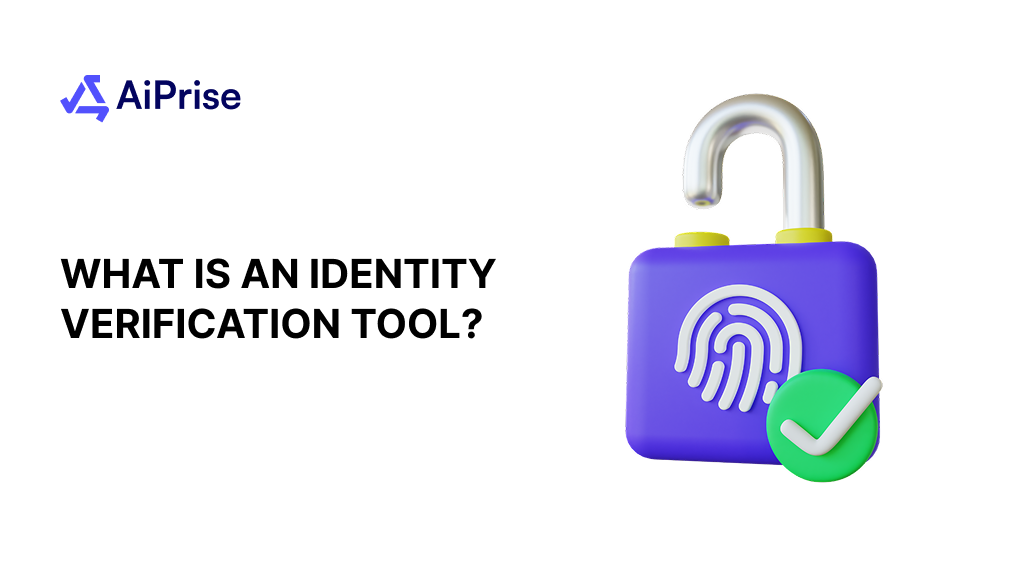
Key Takeaways










Modern businesses face growing challenges in confirming that their customers, users, and partners are truly who they claim to be. An identity verification tool is essential for establishing trust, preventing fraud, and ensuring compliance with regulations in an increasingly digital world.
Whether onboarding new customers, processing online transactions, or safeguarding sensitive data, robust ID verification solutions help organizations verify identities quickly and accurately.
This blog will take you through what identity verification tools are, the features that make them indispensable, the benefits they offer, and how businesses across different sectors are using them to enhance security and streamline operations.
TL;DR
- Identity verification tools are digital solutions that confirm a person's identity using document scans, biometrics, and secure data checks.
- How they work: Users upload ID documents, take selfies, or provide personal details, which the system verifies through automated analysis and database cross-referencing.
- Key features: Document verification, biometric authentication, AI-powered fraud detection, multi-factor authentication, regulatory compliance, and user-friendly workflows.
- Core benefits: Prevent fraud, ensure regulatory compliance, speed up onboarding, improve customer trust, and reduce operational costs.
- Where they’re used: Financial services, e-commerce, healthcare, travel, remote workforce management, and government services.
- Why they matter: With rising digital transactions and fraud risks, identity verification tools are now essential for secure, efficient, and compliant business operations
What Is an Identity Verification Tool?
An identity verification tool is a digital solution designed to confirm that an individual is who they claim to be. These tools use a combination of technologies such as document scanning, biometric checks, and database cross-referencing to validate personal information during online interactions.
Unlike manual methods, which often require in-person checks and physical paperwork, online identity verification and digital identity verification companies provide fast, secure, and automated processes that can be completed remotely.
Modern ID verification solutions typically ask users to upload a government-issued ID, take a selfie, or provide other personal details. The tool then analyzes these inputs using advanced algorithms, sometimes leveraging AI, to ensure the information matches and is authentic. This process helps businesses quickly and reliably verify new customers, employees, or partners without the delays and errors associated with manual checks.
For example, when opening a new bank account, a customer may be required to submit government-issued ID documents, undergo a facial recognition scan, or provide additional personal data. The identity verification tool processes these inputs and cross-checks them with trusted databases to confirm the person's identity.
The tool works both for individual identity verification (verifying personal identities) and business identity verification (confirming the legitimacy of companies).
Businesses are increasingly adopting these tools to enhance security and compliance. Let’s take a look at the key features of these tools.
Key Features of Identity Verification Tools
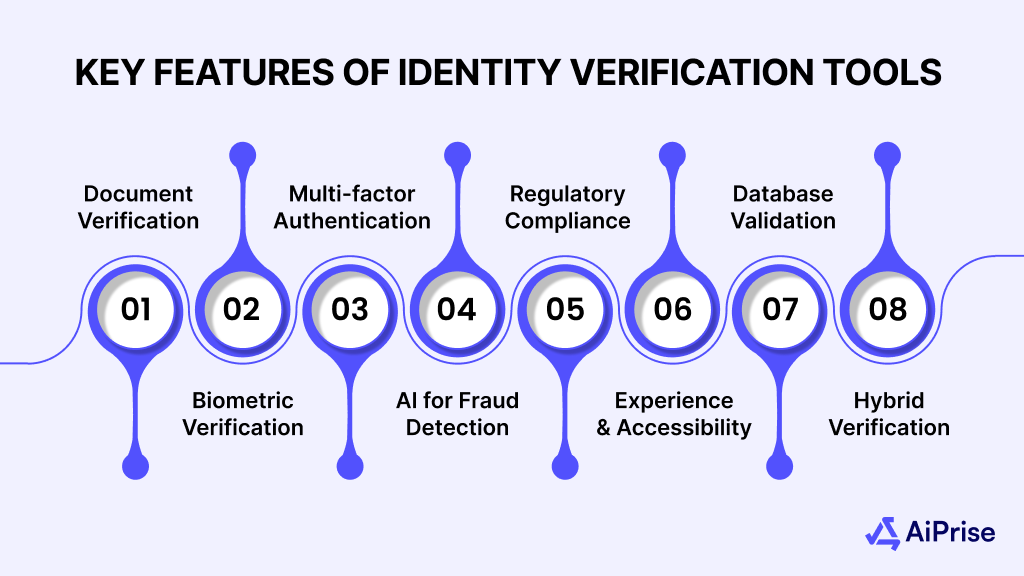
Key features of identity verification tools in 2025 are shaped by advances in technology, regulatory demands, and the need to combat increasingly sophisticated fraud. The most important features include:
- Document Verification: Tools capture and analyze government-issued IDs (passports, driver’s licenses, etc.) using optical character recognition (OCR), barcode/QR code analysis, and sometimes NFC chip reading. They assess document authenticity by checking security features like watermarks and holograms, often referencing global databases.
- Biometric Verification: Integration of facial recognition, fingerprint, and sometimes voice or iris recognition. Liveness detection ensures the person is present and not using a spoof (e.g., photo or video). Biometric comparison matches the user’s selfie to the photo on their ID.
- Multi-factor Authentication (MFA): Incorporates two-factor authentication (2FA), often combining passwords with biometrics, SMS/email codes, or hardware tokens. This strengthens security beyond single-factor methods.
- AI and Machine Learning for Fraud Detection: AI-driven analysis detects deepfakes, synthetic identities, and other advanced fraud attempts. Machine learning enhances accuracy and adapts to emerging threats.
- Global and Regulatory Compliance: Tools support KYC (Know Your Customer), AML (Anti-Money Laundering), and GDPR compliance, often across multiple countries and jurisdictions. This is crucial for financial institutions and global businesses.
- User Experience and Accessibility: Verification can be done on common devices (smartphones, tablets, laptops) without specialized hardware. Mobile authentication (Face ID, Touch ID) and intuitive workflows reduce user friction.
- Database and Direct Authority Validation: Some solutions cross-reference user data with government or issuing authority databases for direct validation, increasing reliability.
- Automated and Hybrid Verification: Many platforms offer both fully automated verification and hybrid models with human oversight for edge cases or higher-risk scenarios.
With these key features in place, it’s time to explore some of the key advantages these tools bring to the table.
Benefits of Using an Identity Verification Tool
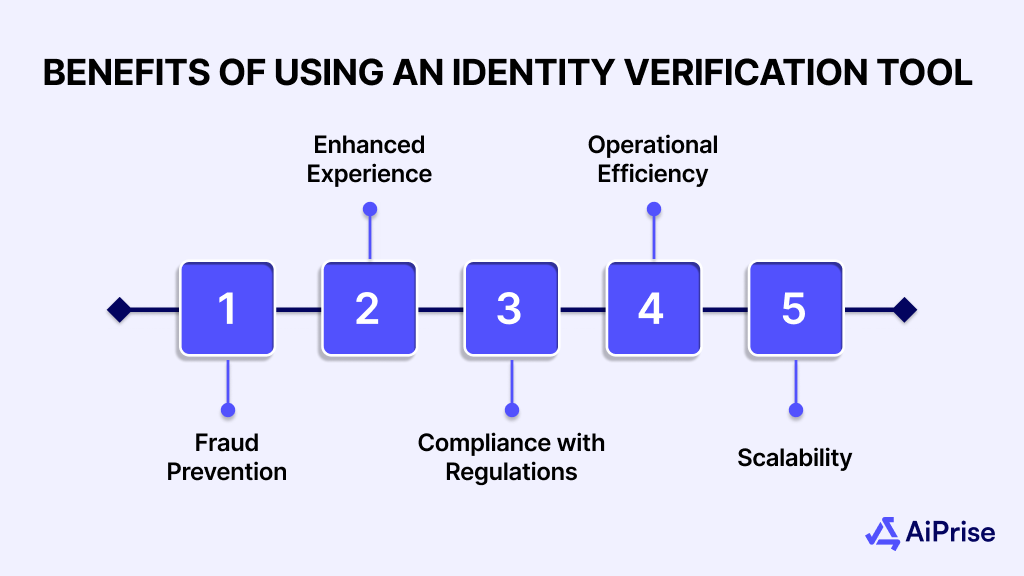
Identity verification tools provide a wide range of benefits that help businesses streamline operations, protect against fraud, and ensure compliance with regulatory standards. Here are some of the key advantages:
Fraud Prevention
Identity verification tools play a crucial role in preventing fraudulent activities. By verifying the identity of users and businesses in real-time, these tools help to ensure that only legitimate individuals or entities gain access to sensitive services or complete transactions.
For example, in financial services, a bank can prevent identity theft or financial fraud by confirming that a customer is who they claim to be before allowing them to open an account or process a payment.
Enhanced Customer Experience
While security is a top priority, businesses must also ensure that the identity verification process is quick and user-friendly. A streamlined, automated verification process improves the overall customer experience.
For example, customers can complete verification steps without having to visit a physical location or wait days for approval. With instant results, businesses can onboard customers faster and provide a seamless experience, leading to higher satisfaction and conversion rates.
Compliance with Regulations
Compliance with industry regulations is a major concern for businesses, particularly in sectors like banking, fintech, and healthcare. Identity verification tools are specifically designed to help businesses meet KYC (Know Your Customer) and AML (Anti-Money Laundering) requirements. These tools ensure that companies can gather the necessary information to comply with regulatory frameworks and avoid penalties.
Furthermore, these tools are regularly updated to reflect changing regulations, ensuring that businesses stay compliant with the latest laws without needing to constantly monitor for updates.
Operational Efficiency
By automating the identity verification process, businesses can reduce the need for manual checks, saving both time and resources. Manual processes are not only time-consuming but also prone to human error, which can lead to security vulnerabilities and delays. Automated verification reduces these risks and helps businesses operate more efficiently.
This also frees up staff to focus on higher-value tasks, such as customer service or business development.
Additionally, automating identity verification allows businesses to scale more easily as they grow, handling higher volumes of verification without needing to increase resources proportionally.
Scalability
As businesses expand, they need solutions that can keep up with increased demand. Identity verification tools are scalable, meaning they can handle growing volumes of customers or transactions without compromising on speed or accuracy. Whether a business is processing hundreds or thousands of verifications per day, these tools can support increased traffic and adapt to the company’s evolving needs.
This scalability is crucial for businesses entering new markets or regions, where regulatory requirements and customer verification processes may differ. An identity verification system that can easily scale to meet these demands will help businesses maintain efficiency and compliance without adding complexity.
Overall, the adoption of identity verification tools brings tangible benefits to businesses, including better security, streamlined operations, and a better customer experience, while ensuring compliance with evolving regulations.
And it’s time to take a closer look at how these tools are being applied across different industries to solve real-world challenges and improve security and efficiency.
Common Use Cases for Modern Businesses
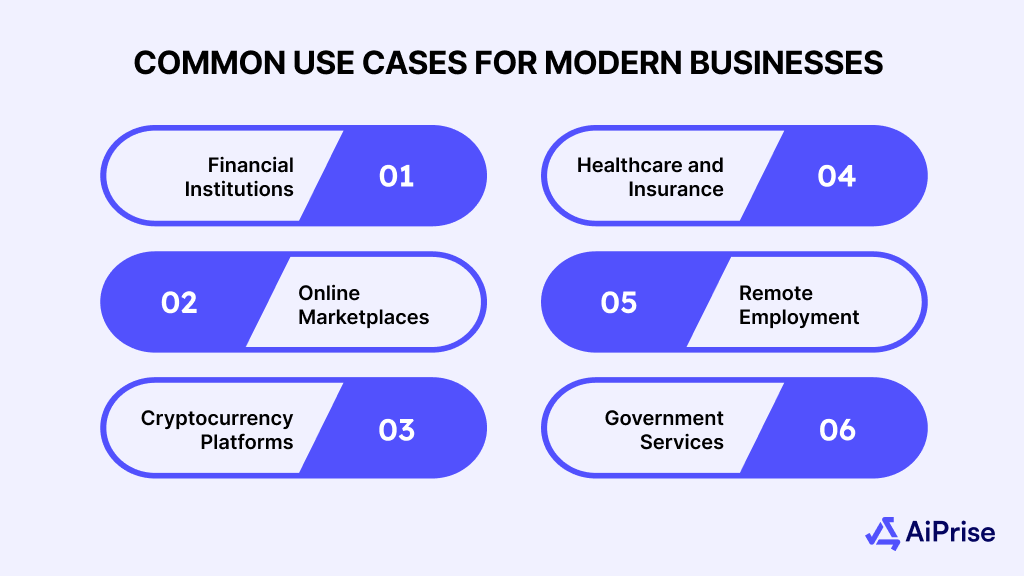
Identity verification tools are versatile and can be applied across various industries, helping businesses meet security and compliance requirements while improving operational efficiency. Below are some key use cases where identity verification tools are especially beneficial:
Financial Institutions
Banks, credit card companies, lenders, and fintechs use identity verification solutions to meet KYC and AML regulations. These tools help confirm customer identities during account opening, loan applications, and high-value transactions, reducing fraud and ensuring regulatory compliance
Additionally, these tools help to onboard new customers quickly, enhancing the user experience. For example, a customer may use their smartphone to take a photo of their ID and undergo biometric verification, completing the process within minutes. This eliminates the need for in-person visits and speeds up the entire process.
E-commerce & Online Marketplaces
E-commerce platforms benefit from identity verification tools to ensure that transactions are legitimate and to prevent fraud. By verifying the identity of customers at the point of purchase, e-commerce businesses can reduce chargebacks, fraudulent orders, and account takeovers. This is especially important for high-ticket items or international transactions where the risk of fraud is higher.
Moreover, identity verification enhances customer trust. Buyers are more likely to feel secure when they know a verified system protects their personal data and payment methods.
Cryptocurrency Platforms
Cryptocurrency platforms face unique challenges when it comes to identity verification. Due to the pseudonymous nature of digital currencies, exchanges must verify the identity of users before allowing them to buy, sell, or trade assets. KYC regulations have become increasingly important in the cryptocurrency space to prevent money laundering, fraud, and other illicit activities.
Cryptocurrency platforms use identity verification tools to ensure that only legitimate users are involved in transactions. This protects both the platform and its users while maintaining compliance with global financial regulations.
Healthcare and Insurance
In the healthcare and insurance industries, identity verification is crucial for safeguarding sensitive patient and policyholder information. Verifying the identity of individuals before accessing medical records or processing insurance claims reduces the risk of identity theft, fraud, and misuse of personal health information.
Additionally, healthcare providers use these tools to verify insurance details, ensuring that claims are processed for the correct individuals and preventing fraudulent billing. By integrating identity verification into their systems, these industries enhance security and reduce the likelihood of fraud in both healthcare and insurance services.
Remote Employment
With the rise of remote work, companies are increasingly adopting identity verification tools to confirm the identity of new hires and contractors. This is essential for safeguarding company information, particularly when employees work from different geographic locations or handle sensitive data.
Employers can verify the identity of remote workers through online verification systems that include document checks and biometric authentication. This ensures that the person hired for a job is indeed who they claim to be, which is especially important for positions that require access to confidential company data or systems.
Government Services
Governments around the world are leveraging identity verification tools to provide secure access to online services. Citizens may need to verify their identity to access services like tax filing, social security benefits, voting, or healthcare services. Tools ensure that only authorized individuals can access government programs and services, protecting against identity theft and fraud.
For example, during elections, governments can use online identity verification systems to confirm that each voter is eligible and ensure that the process is secure and tamper-proof.
The versatility and efficiency of identity verification tools make them indispensable for modern businesses that aim to operate securely in a digital-first world. Let’s explore how to choose the best identity verification tool to meet your business needs.
How to Choose the Right Identity Verification Tool
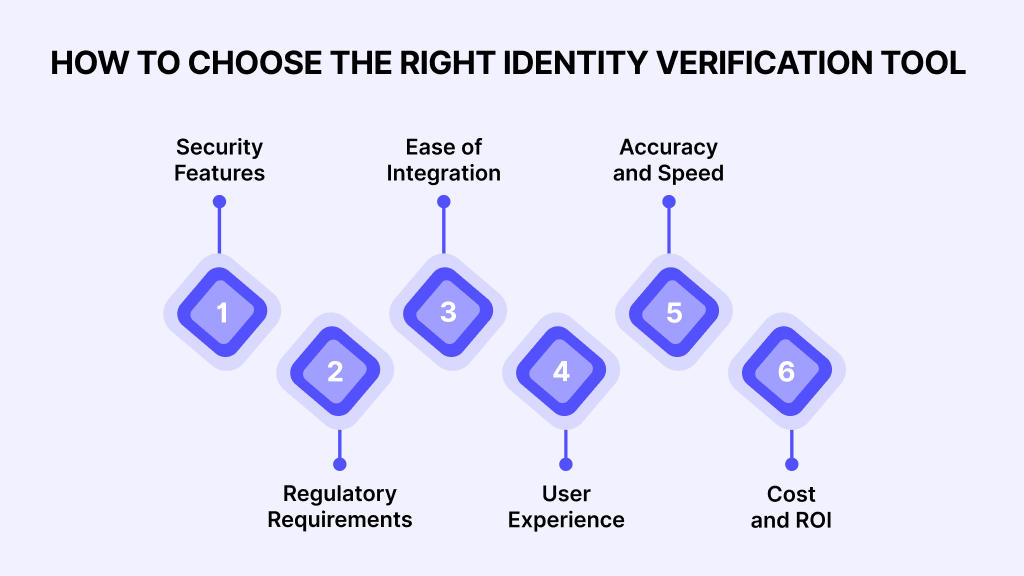
Selecting the right identity verification tool is a critical decision for any business. With a variety of solutions available, it’s important to carefully evaluate several factors to ensure that the tool aligns with your specific needs.
Here are the key considerations when choosing the best identity verification tool for your business:
Security Features
The primary function of any identity verification tool is to protect against fraud and unauthorized access. Look for tools that use advanced encryption technologies to safeguard sensitive data. Additionally, the solution should offer secure storage and management of user information in compliance with data privacy regulations such as GDPR.
It’s also important to consider features like biometric authentication, multi-factor authentication (MFA), and AI-powered fraud detection to ensure that the system can effectively prevent fraudulent activities while maintaining a seamless user experience.
Compliance with Regulatory Requirements
Different industries face different compliance requirements. For example, financial institutions must adhere to KYC (Know Your Customer) and AML (Anti-Money Laundering) regulations, while healthcare organizations may need to comply with HIPAA (Health Insurance Portability and Accountability Act) standards. Ensure that the identity verification tool you choose is designed to meet the regulatory requirements specific to your industry and geographical region.
The tool should also be capable of adapting to any changes in regulatory laws, minimizing the risk of non-compliance, and helping you avoid potential fines or penalties.
Ease of Integration
Your identity verification tool should integrate smoothly with your existing systems, whether they’re customer relationship management (CRM) platforms, payment gateways, or other business applications. Consider solutions that provide flexible APIs or pre-built integrations for seamless deployment. The integration process should be as smooth and straightforward as possible to minimize disruptions to your operations.
Additionally, ensure that the tool can scale as your business grows. The verification tool should be able to handle an increasing volume of users or transactions without compromising speed or accuracy.
User Experience
A smooth and intuitive user experience is essential for minimizing friction during the verification process. The tool should offer a simple, user-friendly interface that guides users through each step, from uploading identification documents to completing biometric checks.
A complex or lengthy verification process may lead to higher abandonment rates, especially for online platforms. By offering a fast, simple, and clear verification process, you increase the likelihood of higher conversion rates and greater customer satisfaction.
Accuracy and Speed
Choose an identity verification tool that is both accurate and fast. In industries like finance and e-commerce, where time is often of the essence, real-time verification is crucial. The tool should quickly process identity data and flag discrepancies, allowing you to act swiftly if fraudulent behavior is detected.
Moreover, ensure the tool can handle various types of verifications, such as document checks, biometric scans, and 2FA, to ensure high levels of accuracy across different customer profiles and situations.
Cost and ROI
While cost is always an important consideration, it should not be the only factor. Evaluate the total cost of ownership, which includes not only the initial investment but also ongoing maintenance, updates, and customer support. Compare the pricing models of different providers to find a solution that fits your budget without sacrificing quality.
Consider the potential return on investment (ROI) when choosing a verification tool. A higher upfront cost may be justified if the tool significantly reduces fraud, accelerates customer onboarding, and helps with regulatory compliance, ultimately saving money in the long run.
Having explored the key factors to consider when selecting an identity verification tool, it’s time to look at some of the leading providers in the market. These providers offer innovative solutions to meet a variety of business needs.
Leading Identity Verification Providers
Several identity verification providers offer advanced solutions designed for various business needs. Some of the top players in the industry include:
- AiPrise: AiPrise offers a comprehensive identity verification platform that combines advanced KYC, AML, and fraud prevention tools. By leveraging over 120 global data sources, AiPrise ensures businesses can verify both individual and business identities quickly and efficiently, while staying compliant with evolving regulations.
- Jumio: Known for its AI-driven identity verification services, Jumio provides a robust solution for document and biometric verification. It is trusted by major global organizations across industries like banking, healthcare, and e-commerce.
- Onfido: Onfido offers a scalable identity verification platform that combines machine learning with human review to ensure high accuracy and compliance. It is widely used by businesses in financial services and the gig economy.
- IDology: A provider specializing in flexible identity verification solutions, IDology helps businesses reduce fraud and ensure compliance with industry regulations, particularly in financial services.
- Veriff: Veriff provides a comprehensive identity verification platform that includes document verification, facial recognition, and fraud detection, making it suitable for a wide range of businesses, including fintech and e-commerce.
While these providers are leading the way in identity verification, the industry continues to evolve rapidly. Let’s now explore the future of identity verification tools and the trends shaping their development.
The Future of Identity Verification Tools
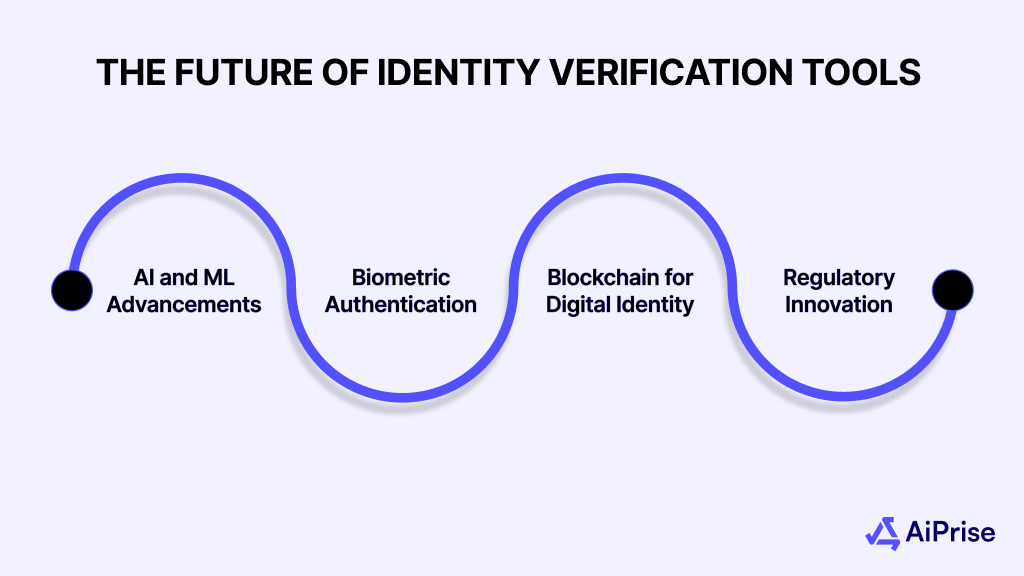
The identity verification space is evolving rapidly, driven by technological advancements and the increasing need for security and privacy. Over the next few years, we can expect to see several key trends shaping the future of identity verification tools:
- AI and Machine Learning Advancements: AI and machine learning will continue to improve the accuracy and speed of identity verification. These technologies will enable real-time risk assessments, making it easier to detect and prevent fraudulent activities before they occur.
- Biometric Authentication: Biometric authentication methods, such as facial recognition, fingerprints, and voice recognition, are likely to become more prevalent. These methods offer a higher level of security and convenience for both businesses and users.
- Blockchain for Digital Identity: Blockchain technology may play a larger role in decentralizing identity verification. With blockchain, individuals could have greater control over their own digital identities, reducing reliance on centralized systems and enhancing privacy.
- Regulation-Driven Innovation: As regulatory standards evolve, identity verification tools will continue to adapt to meet the latest compliance requirements. This will lead to more robust, secure, and flexible solutions that cater to a broader range of industries.
As these trends unfold, businesses will need to stay ahead of the curve by adopting innovative identity verification tools. These solutions will offer enhanced security, flexibility, and compliance, ensuring businesses are prepared for the future of digital identity management.
Conclusion
Identity verification tools are essential for modern businesses to stay secure, compliant, and efficient in today’s digital world. By implementing the right verification solution, businesses can prevent fraud, reduce operational costs, and improve the overall customer experience.
With the right tools in place, companies can confidently handle customer identities, meet regulatory requirements, and scale their operations effectively.
Ready to enhance your identity verification process? Book a Demo with AiPrise today to see how our platform can help your business streamline security and compliance.
FAQs
1. What is an identity verification tool?
A: An identity verification tool is a digital solution used by businesses to confirm the identity of individuals or organizations. It ensures that a person or business is legitimate before granting access to services, transactions, or accounts. These tools use technologies such as document verification, biometric authentication, and data validation.
2. Why do businesses need identity verification?
Businesses need identity verification to protect against fraud, comply with regulatory standards (like KYC and AML), and ensure the safety of customer data. It helps establish trust, prevent unauthorized access, and safeguard sensitive information.
3. How does identity verification help in fraud prevention?
Identity verification helps prevent fraud by validating the identity of users and detecting any inconsistencies or red flags. Tools cross-check provided information against multiple trusted sources to identify fraudulent behavior, reducing the risk of financial crimes or unauthorized transactions.
4. What are some examples of identity verification methods?
Common methods include document verification (e.g., scanning government-issued IDs), biometric authentication (e.g., facial recognition or fingerprint scanning), and two-factor authentication (2FA), where a second verification step is required for additional security.
5. How can identity verification tools improve customer experience?
Identity verification tools can enhance customer experience by offering a fast, user-friendly process for verifying identity. Customers can complete the verification process quickly, often with their smartphone, leading to a seamless and efficient experience, reducing friction during onboarding or transactions.
6. How does AiPrise help businesses with identity verification?
AiPrise offers a comprehensive identity verification platform that combines advanced KYC, AML, and fraud prevention tools. With real-time data validation, biometric checks, and multi-channel verification, AiPrise ensures businesses remain compliant and protected against fraud, all while streamlining operations.
You might want to read these...

AiPrise’s data coverage and AI agents were the deciding factors for us. They’ve made our onboarding 80% faster. It is also a very intuitive platform.





Speed Up Your Compliance by 10x
Automate your compliance processes with AiPrise and focus on growing your business.





